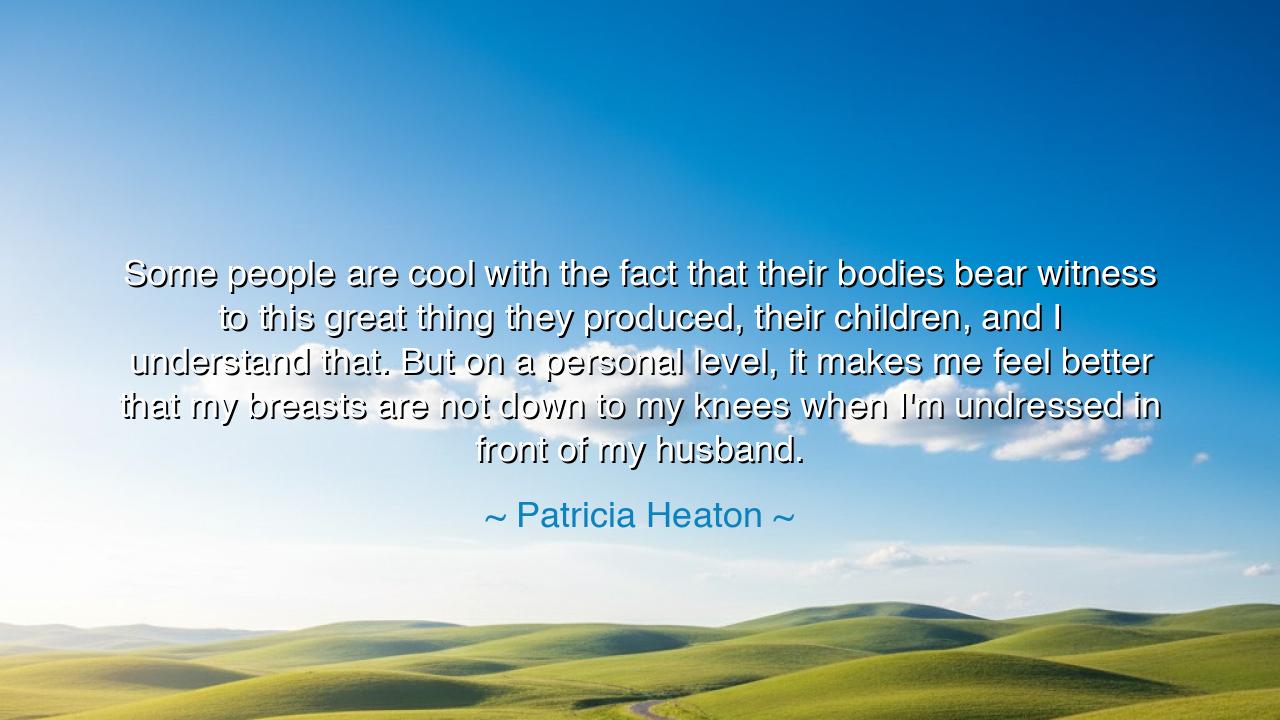
Some people are cool with the fact that their bodies bear witness
Some people are cool with the fact that their bodies bear witness to this great thing they produced, their children, and I understand that. But on a personal level, it makes me feel better that my breasts are not down to my knees when I'm undressed in front of my husband.






Listen now, O children of wisdom, for the words of Patricia Heaton speak with a clarity that reveals a deep truth about the nature of beauty, self-perception, and the relationship between the body and the passage of time. She said—"Some people are cool with the fact that their bodies bear witness to this great thing they produced, their children, and I understand that. But on a personal level, it makes me feel better that my breasts are not down to my knees when I'm undressed in front of my husband." These words, though spoken with humor, carry a profound message about personal comfort, self-love, and the way in which we relate to our own bodies.
In these words, Heaton reveals that the body, though it is a vessel that carries us through the world, is also subject to the forces of time and experience. Motherhood, though one of the greatest of life’s callings, often leaves traces on the body, marks of the great act of creation. Stretch marks, scars, and the effects of pregnancy or breastfeeding are signs of sacrifice, of the miracle of life that the body brings into the world. Yet, in the same breath, Heaton acknowledges that these physical changes—though they are meaningful—do not always align with the way we wish to feel about ourselves in our most intimate moments.
What is it, then, that Heaton seeks? It is not an escape from reality but a desire for comfort and self-assurance in her own skin. In acknowledging the changes to her body, she also speaks to the desire for personal confidence, for the ability to feel attractive and comfortable in her own skin, especially in the presence of those who are closest to her. There is a balance between celebrating the body’s journey and embracing the changes that come with time, and seeking to maintain a sense of dignity and pride in one’s appearance, even as the body evolves.
Consider, O children, the example of Cleopatra, the great queen of Egypt, who, despite her unmatched beauty and influence, was said to be keenly aware of how others perceived her. Cleopatra’s beauty, which was celebrated across the ages, was not just in her appearance but in her confidence, her ability to command the attention and respect of others. She understood that true beauty is not just what the world sees, but what we feel about ourselves. Her confidence was not born from perfect physical attributes, but from a deep sense of self-worth that radiated through her actions, her intellect, and her charisma. In this way, Cleopatra’s example shows us that beauty is not a static thing, but something that comes from within, from the peace we make with ourselves.
Similarly, the wise Socrates—a man whose influence was felt far beyond his time—was not one to preoccupy himself with outward appearances. Socrates was known to embrace his physical imperfections. He did not care for what others thought of his body; instead, he focused on the mind and soul, the inner beauty that transcended the fleeting nature of physical perfection. Socrates teaches us that true beauty lies in the cultivation of wisdom, character, and inner peace, not in the superficial judgments of the body.
Heaton’s words, therefore, reflect a universal truth: we all long to feel good in our own skin, to be comfortable with the changes that life brings, whether it is through the journey of motherhood or the passage of time. Her honesty about her own body is a testament to the fact that self-love and self-acceptance are ongoing journeys, and that we must learn to love ourselves, not in spite of our imperfections, but because of them. The body, like everything in life, changes, but the essence of who we are—the strength of our character, our love for others, our ability to make a difference in the world—remains constant.
The lesson here, O children, is simple yet powerful: do not fear the changes that come with time. Do not measure your worth by the shifting contours of your body, for it is the soul, the heart, and the mind that define you. Yet, in embracing the changes, take joy in the comfort of finding balance between honoring the physical self and embracing the deeper, unchanging aspects of who you are. Seek to feel good in your own skin, for in that acceptance, you find a peace that no external judgment can take away.
So let us live with the wisdom of Patricia Heaton, recognizing that beauty is not a perfect image, but the confidence to stand tall in our own truth, the courage to embrace our bodies as they are, and the love to cherish the journey that life brings us. True beauty lies not in perfection, but in acceptance—the acceptance of who we are, of where we’ve been, and of where we are going. Embrace yourself, O children, for the most radiant beauty comes from the strength to love what is real.






AAdministratorAdministrator
Welcome, honored guests. Please leave a comment, we will respond soon